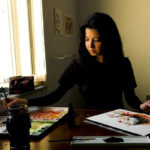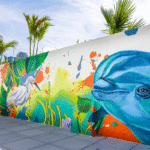Jared McGriff at NSU Art Museum Fort Lauderdale
00;00;01;09 – 00;00;28;02
Jared McGriff
This is a snapshot of what happens when you work on something every day constantly. I work on painting every day, I paint and draw every day of my life. The ubuntuya philosophy around seeing others as yourself. That’s where the title comes from here in a space where that is, where that is happening, where you’re actually seeing you
00;00;28;02 – 00;00;53;14
Jared McGriff
as as the way an idea that many ancient cultures have is definitely prominent within African philosophies around how you’re only actualized as an individual when the group is is whole. I like to think about how we actually see and how vision is really a function of not only, you know, the physical mechanism of how our eyes work
00;00;53;14 – 00;01;10;23
Jared McGriff
, but there’s also a great deal of of memory. Sometimes, like now we see everyone sees each other with our limbs and things like that. But if we’re riding public transportation or walking down the street, a lot of people, you know, maybe their first image of us would only be the side of our face or half of our
00;01;10;23 – 00;01;28;10
Jared McGriff
body or only our head or, you know, these kind of real ways we see people and things. So that’s kind of what these like discarded half faces and as it’s capturing kind of movement in motion. So it’s definitely a comment on how people are seen and how people see as well.
00;01;29;22 – 00;01;50;29
Jared McGriff
What’s interesting about making work that is abstract in nature, but also figurative, I can kind of take advantage of these use marks to center one’s vision and to create movement to anchor the eyeline, things that make the work richer over time.
00;01;52;11 – 00;02;09;05
Jared McGriff
My family background coming from enslaved people who came from Africa, who’ve been in this country for a very, very long time, there’s been a lot of migration movement from from south to west, you know, to Oklahoma and California, and I’m moving here.
00;02;09;06 – 00;02;34;12
Jared McGriff
The narrative is common among a lot of black folks. This is too on on top of the world, and this is carrying the scalps of white men and liquor store bags during prohibition era. And both of these works kind of came through these thought experiments about history and specifically, you know, my history and my family coming from
00;02;34;12 – 00;02;51;29
Jared McGriff
Texas and Oklahoma West, you know, during a time period of terror to try to make a life for themselves. And this is kind of thinking about, you know, education with these two that, you know, maybe they’re coming from school or from church or something like that.
00;02;51;29 – 00;03;18;21
Jared McGriff
But it’s about the relationship between these two, these two girls in their environment. And like this, this painting, it’s, you know, a landscape that kind of flattens the perspective of the environment, as is done in like Chinese painting, Chinese watercolor painting and landscape painting.
00;03;18;28 – 00;03;40;10
Jared McGriff
I like I’ve always like that, and I think it comes through in these in these images where we can see kind of the flattening of perspective. And then here I actually put like a structure in perspective to kind of, you know, again, pull the eye and to show the depth of of space.
00;03;41;05 – 00;03;58;15
Jared McGriff
And again, it kind of calls out to like almost time travel in a way of like, you know, and that’s again, where like, this is a piece that is kind of about it is actually about time travel, where the thought experiment led me to think about, you know, what would happen if you know people from my like
00;03;59;02 – 00;04;19;17
Jared McGriff
, you know, great grandfathers air, you know, these were people who I own. I knew they were alive when I grew up, and these people came from the twenties and thirties and in Texas and Oklahoma and places like this where they were dealing with, you know, great great levels of control, government control, really.
00;04;19;29 – 00;04;38;29
Jared McGriff
That’s what the these pieces are. I think you can kind of see some of this estrangement. You can see some of this, a lot of missing pieces, some of the longing, you know, attempting to understand things like this is this is the work is reflective of of my family’s experience in this country, for sure.
00;04;41;03 – 00;04;59;02
Jared McGriff
What brought me to Miami was a mix of personal reasons and the need to pursue painting. I was living in the Bay Area where I fell. I think other people feel this as well that the creative energy isn’t as strong as it is as in a place like Miami.
00;05;00;07 – 00;05;18;05
Jared McGriff
When visiting Miami, I noticed that there was a lot of momentum around creativity. There’s also the Diaspora in terms of black people here from the Caribbean and all over to, you know, making work that was speaking to that audience.
00;05;18;06 – 00;05;21;10
Jared McGriff
So that’s that’s what drew me. That’s what drew me to Miami.






